Wix has seen some huge improvements to the platform's SEO capabilities in recent years, and it has come a long way in a relatively short space of time.
For businesses who are just getting started or don't have the budget to engage a professional web designer and developer, Wix is a great way to get online for the first time.
In this guide, we are going to look at how you can improve your Wix site's SEO performance, as well as share insights on the pros and cons of the platform.
This guide will cover:
What is Wix? Is Wix Good for SEO? The Pros and Cons of Wix for SEO Who is Wix Right For? What SEO Features Does Wix Include? 11 Wix SEO Tips To Improve Your Website's Organic PerformanceWhat is Wix?
Wix is a popular website builder that now hosts more than 160 million websites. It is loved by small businesses because of its low cost (you can even launch a Wix site for free) and easy to use drag-and-drop interface.
Wix is great for small businesses and startups who are looking to venture onto the web for the first time and want to build their website themselves.
With hundreds of different starter templates available, everyone from restaurants to tradespeople can launch a site in no time at all. The platform even boasts eCommerce functionality for those looking to launch their first online store, as well as a whole host of apps to help you to do more with your website.
But let's clear one thing up. Wix isn't for everyone.
It is a drag-and-drop website builder ahead of anything else and serves the purpose of helping small businesses to have a web presence. But Wix doesn't try to be anything else, and for the market it serves, it is a solid platform and a great option for many.
In fact, it is regularly cited as the best free website builder out there and is often compared with Weebly and GoDaddy websites.
If you are looking for a platform that will offer you extensive customization options or are an experienced developer, Wix probably isn't for you. WordPress would probably be a better option.
But if you are a small business, Wix will most likely come up as a consideration.
Is Wix Good for SEO?
Wix has come under fire a number of times from the SEO industry and is sometimes cited as being a problematic platform that won't rank on Google.
A lot of these criticisms come from the fact that the platform used to have serious SEO issues, including:
A poor URL structure that was built around each page being defined by a #. No ability to add alt tags to images. No options to add structured data markup. No ability to optimize title tags and meta descriptions for blog posts.These are by no means all of the historical SEO issues that Wix has had, but none of these problems exist anymore. However, the platform still suffers reputationally because of these past issues.
Wix even launched their own ' Wix SEO Battle' in 2019 to enlist the help of the industry (and offer a rather generous prize of $25,000) to demonstrate that Wix websites can, and do, rank in top spots.
Marie Haynes Consulting (the winners) battled it out with Liquid over a six month period, with the winning team being the one who ranked the highest for the term 'Wix SEO.'
The industry was torn over the motive behind such a battle, with Google's John Mueller raising his concerns.
SEO contests are pretty useless.SEO contests never reflect real life-performance, they generate a ton of spam that negatively affects the whole ecosystem, they're a big waste of time & effort. The smart approach to SEO contests is to ignore them.
— ? John ? (@JohnMu) May 8, 2019However, as a respected and experienced SEO, Marie and her team's thoughts on the platform give a good indication as to it's suitability as a CMS.
In their closing thoughts on the battle, Alec Brownscombe commented:
Generally speaking, our view on Wix and its SEO viability has not significantly changed throughout our experience: They’ve made major improvements, but there are pluses and minuses with the platform, and it really depends on the needs and goals of your website. Knowing it was going to be a couple of ~25-page blog sites competing against one another, our thinking was that we would not be at a disadvantage using Wix. We enjoyed using their site builder and thought that implementing the basic on-page optimizations, providing good content, building authority, and marketing the site effectively were always going to be the most critical factors.
— Alec Brownscombe, Marie Haynes Consulting
And these comments sum up Wix SEO quite nicely. In fact, answering the question of whether or not Wix is good for SEO can be summed up quite simply.
Wix has made huge improvements to its platform from an SEO perspective in recent years, and if you are a small business that is launching a relatively small site (often localized), then you shouldn't struggle to rank just because you are using Wix.
The platform allows you to carry out basic on-page SEO, but that is only the start of a successful SEO strategy.
To rank a website on Google in 2020, you also need to combine solid keyword research with great content, link building, and a wider digital marketing strategy, and if you can get these things right, you won't be held back by Wix.
The Pros and Cons of Wix for SEO
You don't have to look far to find both supporters and haters of Wix, but many of the criticisms come from those who used the platform in the past when it arguably was a lot less search engine friendly than it is today.
Step back in time a few years, and there were fundamental SEO issues with the platform that a site would struggle to rank. And it is this legacy reputation that Wix still carries with it in some circles.
But if you are reading this guide, you probably want to know what the pros and cons of Wix are for SEO today; let's review them.
The Pros
When it comes to the pros of using Wix, these largely relate to the fact that the platform allows small businesses to quickly build their own website and launch their web presence.
The pros of using Wix include:
Wix SEO Wiz
The Wix platform includes the Wix SEO Wiz tool that is designed to help business owners to optimize their websites. By answering just a few questions about your website, location, and keywords, you will be given a plan for your website's SEO. This is a good starting point for absolute beginners who don't know where to start with SEO.
There Is No Coding Needed
You don't need to know any code at all to be able to optimize your Wix site. This is all in-line with the platform's drag-and-drop editor and goal of making it easy and simple to build a website. Any SEO that you can do through Wix can be done through the builder, with no code needed.
Easy Integration to Google Search Console and Analytics
You can really easily integrate both Google Search Console and Google Analytics with Wix, two essential tools that you need.
The Cons
Of course, Wix doesn't try to be an advanced CMS, and that means that there are a number of downsides to using the platform from an SEO perspective.
The cons of using Wix include:
Advanced SEO is Impossible
If you are an experienced SEO, there is a very good chance that you will struggle to optimize the site the way you want to with Wix.
No AMP Support
If you are looking to launch an AMP version of your site, you won't be able to do this with Wix; it is as simple as that.
Who is Wix Right For?
Wix is a great platform for small businesses and bloggers who want to quickly launch a nice looking website themselves.
If there is no need for custom themes or advanced SEO features, Wix offers a strong starting platform when looking for a budget-friendly solution.
In fact, there are even case studies of successful migrations from WordPress to Wix, but it all comes down to the purpose of a website and the growth goals of a specific business.
What SEO Features Does Wix Include?
Wix offers a number of SEO features for those looking to increase their Wix site's organic traffic, and here is a handy quick-glance checklist you can use to reference these:
Edit title tags & meta descriptions Edit H tags (H1, H2, etc.) SEO patterns for default settings across pages Set custom page URLs Edit alt tags on images A reasonable PageSpeed score Mobile-friendly templates Google Analytics & Search Console integration Implement 301 redirects Set canonical tags HTTPS XML sitemap (although this cannot be edited) Structured dataThese are, of course, just features, and to rank your Wix website on Google, you need to understand how to use them to drive success.
11 Wix SEO Tips To Improve Your Website's Organic Performance
If you have decided that Wix is the right platform for you, here are 11 top SEO tips to help you improve your site's organic performance.
1. Use Keyword Research to Identify Target Keywords
If you don't do thorough keyword research, you will not know which keywords and search terms you should be optimizing your web pages for.
It is the first step that you should take in any SEO project, given that it will help you to identify the pages you should create and the keywords you should use in your optimization strategy.
A great starting point for keyword research is SEMrush's Keyword Overview tool, which will help you find and identify the keywords that your target clients and customers are using to search for businesses just like yours.
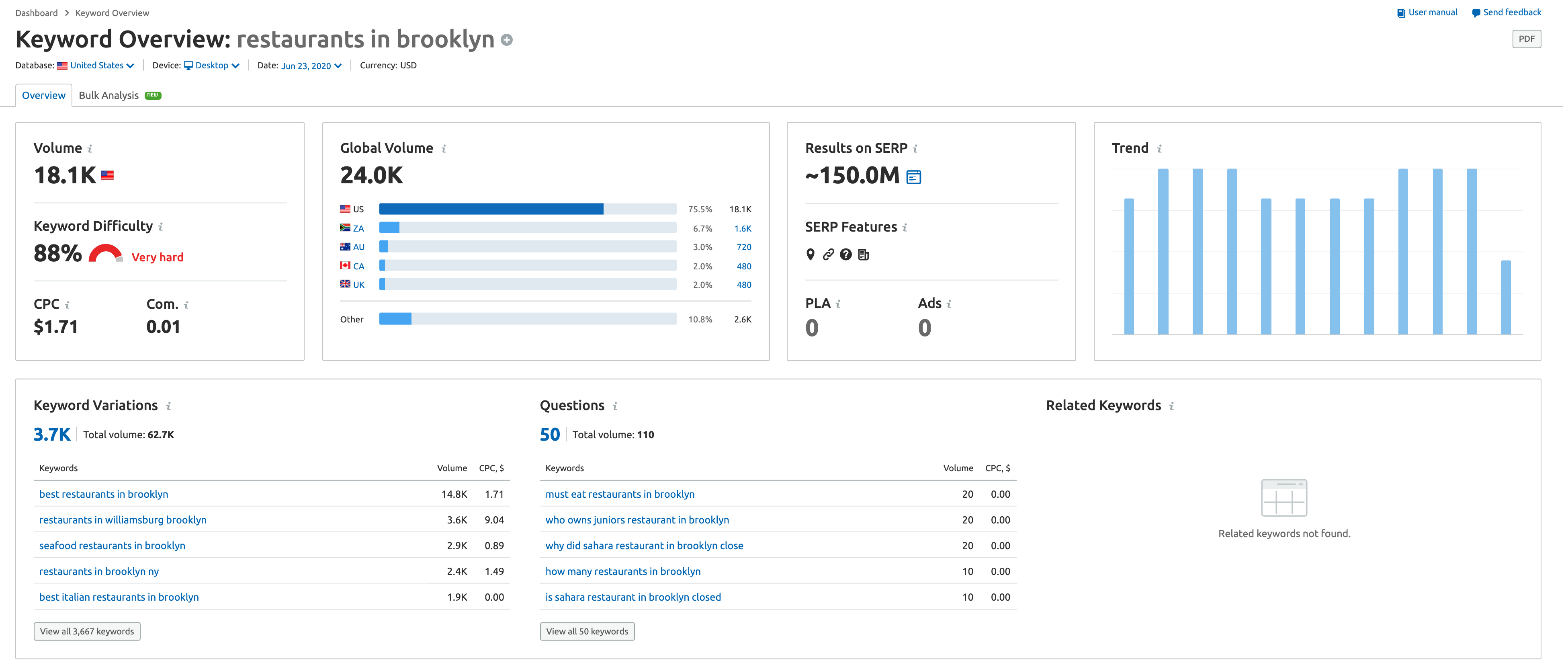
Our guide on how to use SEMrush for keyword research is a great starting point if you need a little help getting started, but you need to know that once you have identified the right keywords to target, putting together an SEO plan becomes easier.
2. Set Up The Wix SEO Wiz
Wix includes the Wix SEO Wiz tool that can help SEO beginners start optimizing their site in minutes.
You will find this under the Settings menu as Get Found on Google.
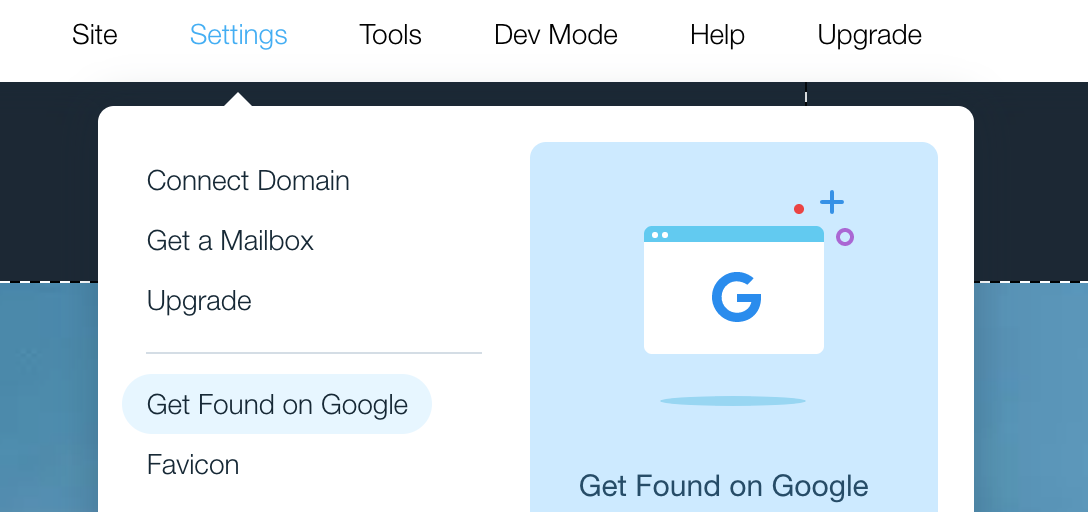
From here, you will be asked a series of questions about your business, including your name, physical address (if you have one), and a description.
Work through the questions, and you will be served your own custom SEO plan that you can work through, including a checklist of tasks.
If you have never done SEO before, this is a great place to start as it will give you easy guidance for some of the tasks that we will recommend next.
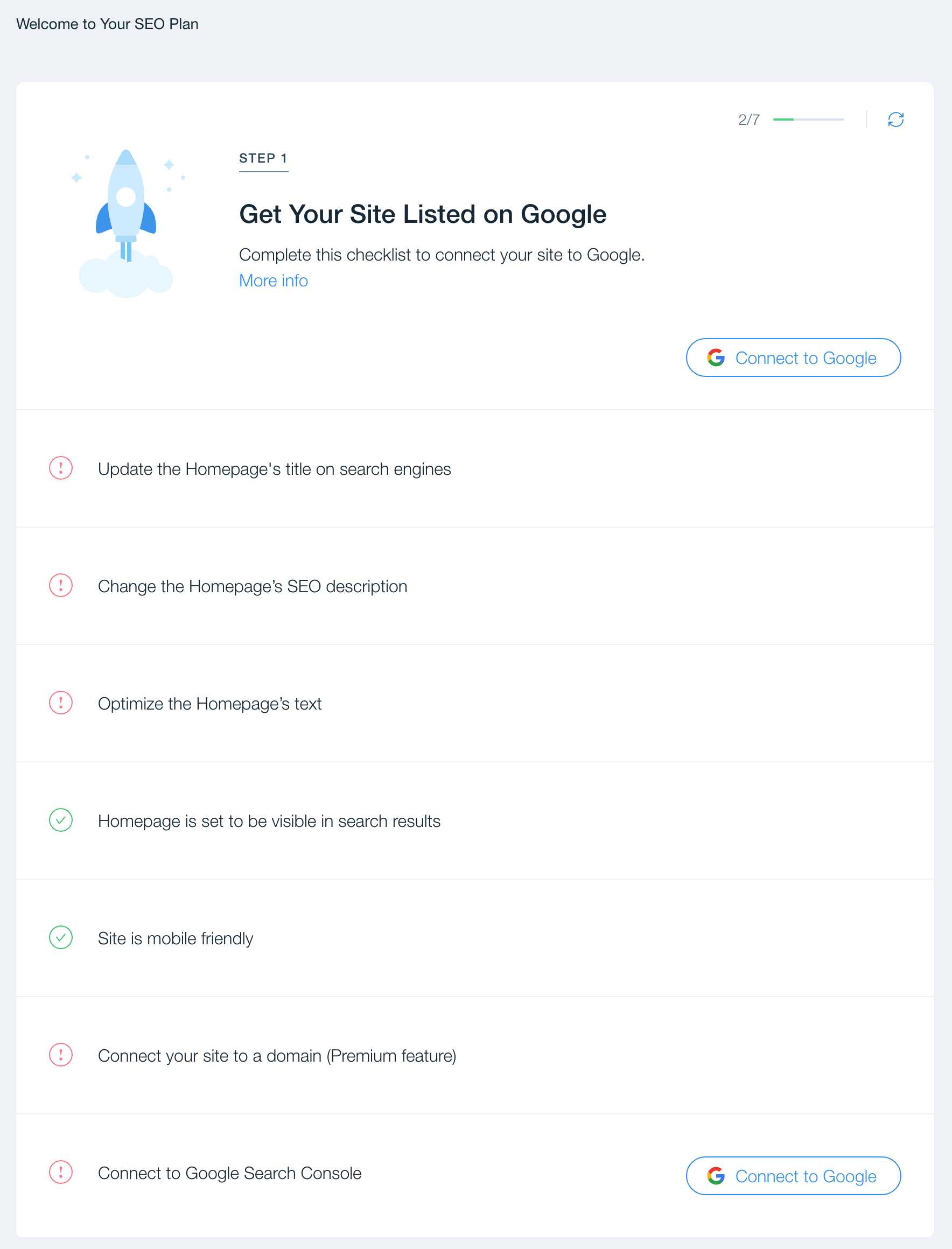
3. Set Up Google Search Console and Analytics
It is really easy to connect Wix to Google Search Console, and it's important that you do this to gain insight into the data that the tool gives you about your site's SEO performance.
If you are on a premium plan, you can hit the 'connect to Google' button, and you can integrate with Google straight away. But if you are on a free plan, you need to do this manually.
To verify Google Search Console, head over to the tool and enter your domain name into the URL prefix box.
Click continue, and you will see an option to verify using an HTML tag.
Copy the tag and head to the settings in your Wix site's dashboard and navigate to the SEO tab. On this page, you will see the advanced SEO settings and an option to add header code meta tags.
Go ahead and paste the code you copied from Search Console here.
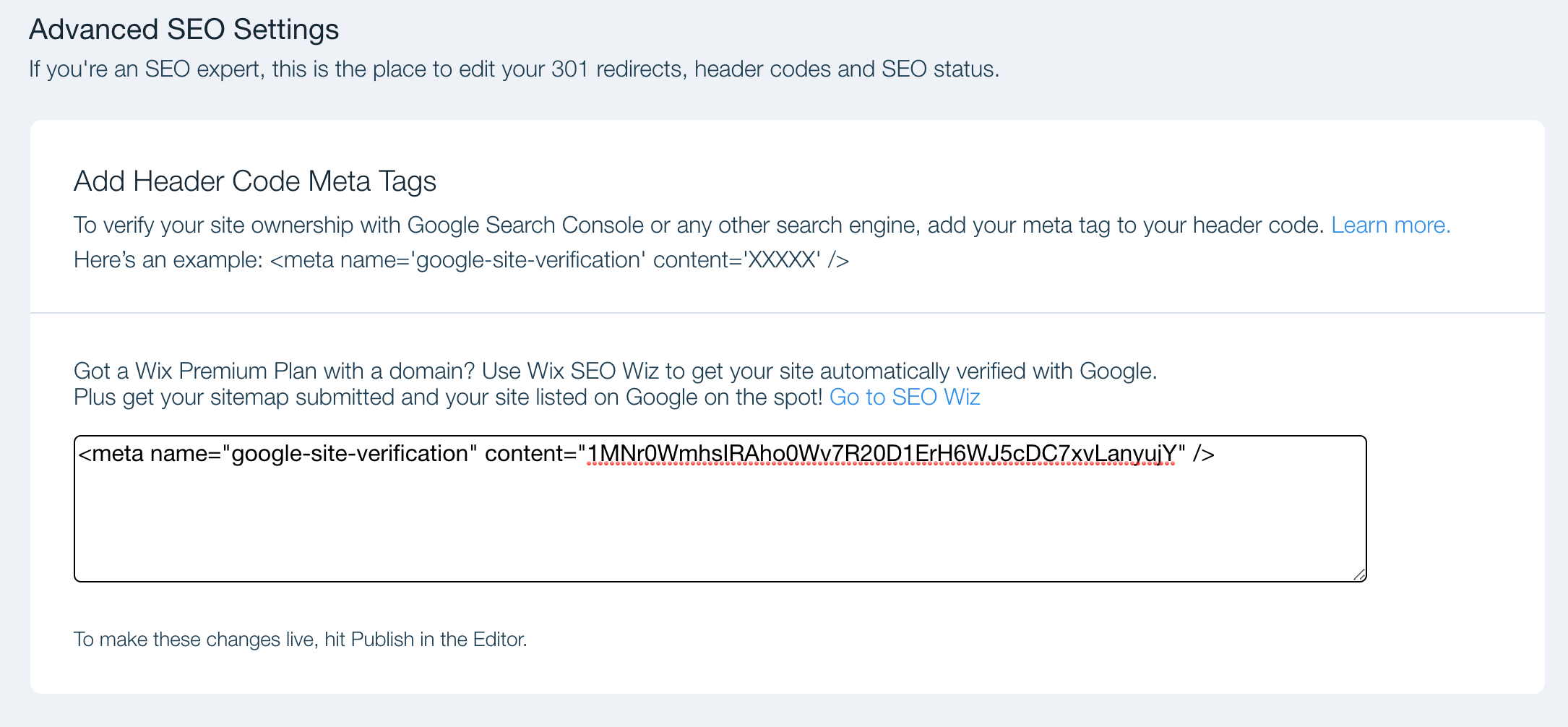
Publish your site and head back to Search Console and hit verify. All done.
To add Google Analytics tracking to your site (which is only available when using a custom domain), you need to sign up for the platform (you can learn how to do this here) and grab your tracking code.
Head to the marketing integrations menu, and you will see an option to connect Google Analytics to Wix.

Once you have connected, you should start to see your stats tracking in the Google Analytics dashboard.
4. Create Optimized Title Tags and Meta Descriptions
Every page on your site needs a unique and optimized title tag and meta description.
Title tags are so important in SEO because they inform both users and search engines what your page is all about. You can learn all about creating optimized title tags here.
You also need to optimize your site's meta descriptions; they are no longer used by Google as a ranking factor but feed the visible description that you see below a web page's title on the SERPs.

It is worth spending the time to write engaging descriptions that encourage users to click your listing over a competitor's link.
You can edit the title tag and meta description for each page on your site on the SEO (Google) tab that is available for each page on the main site menu.
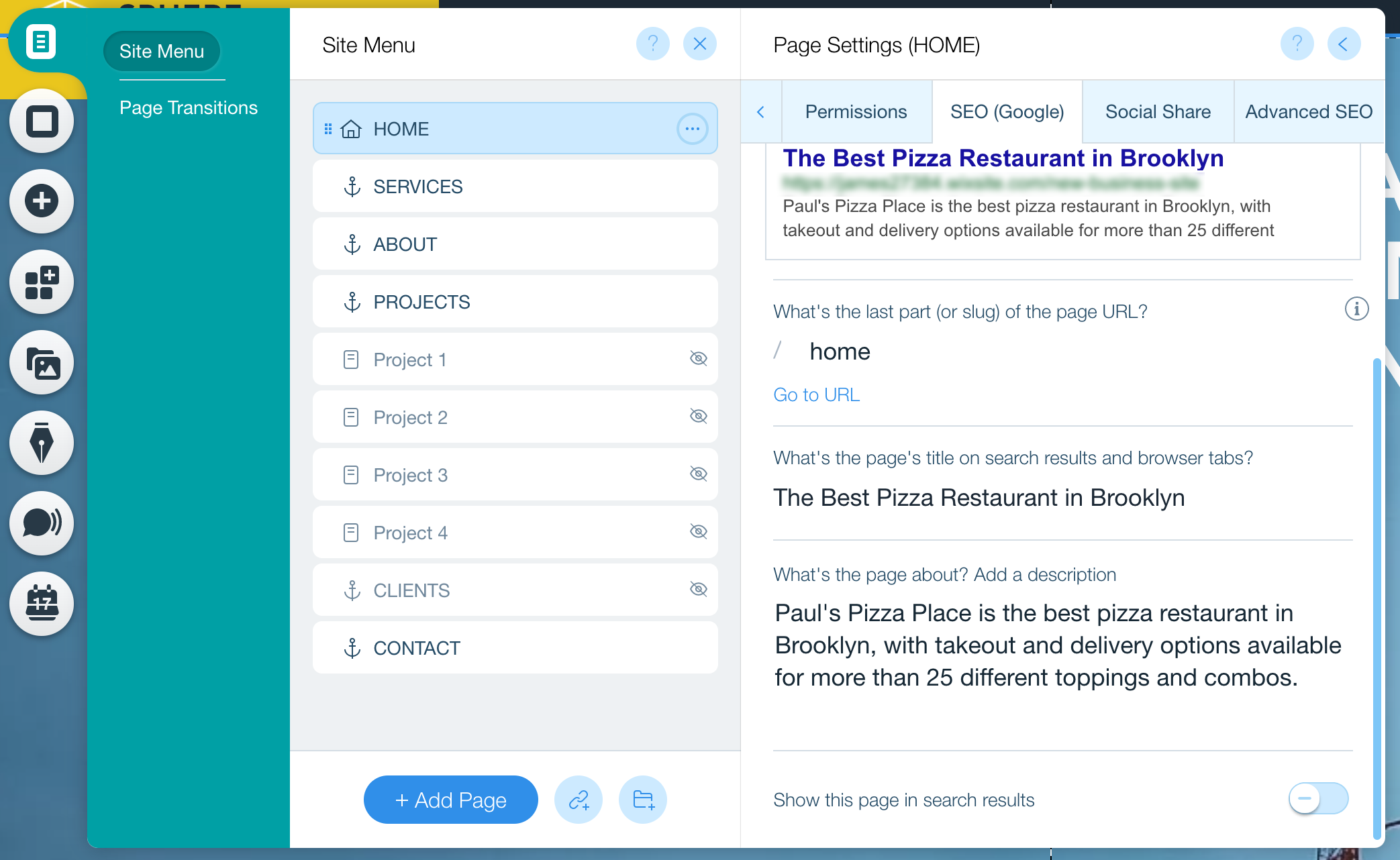
One way that you can make sure you're properly optimizing your site's title tags and meta descriptions is to use the SEMrush on-page SEO checker.
When you run the tool, you'll simply need to add the pages you'd like to optimize and their target keywords, either from an auto import, manually, from a file or from Google Search Console and hit 'collect ideas.'
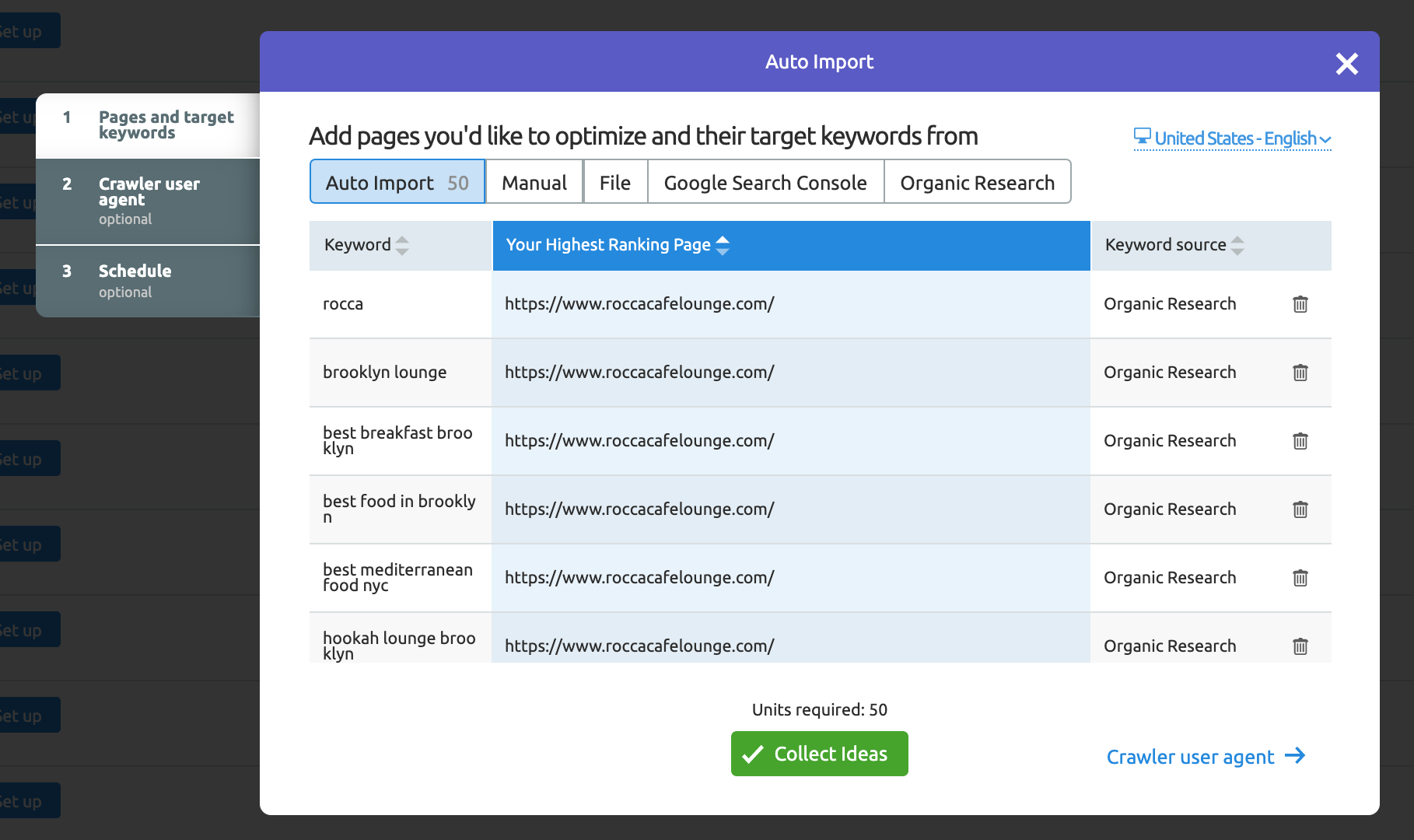
You'll then be served a series of optimization ideas that you can use to better optimize your site's on-page elements, as well as seeing what you're already doing a great job at.
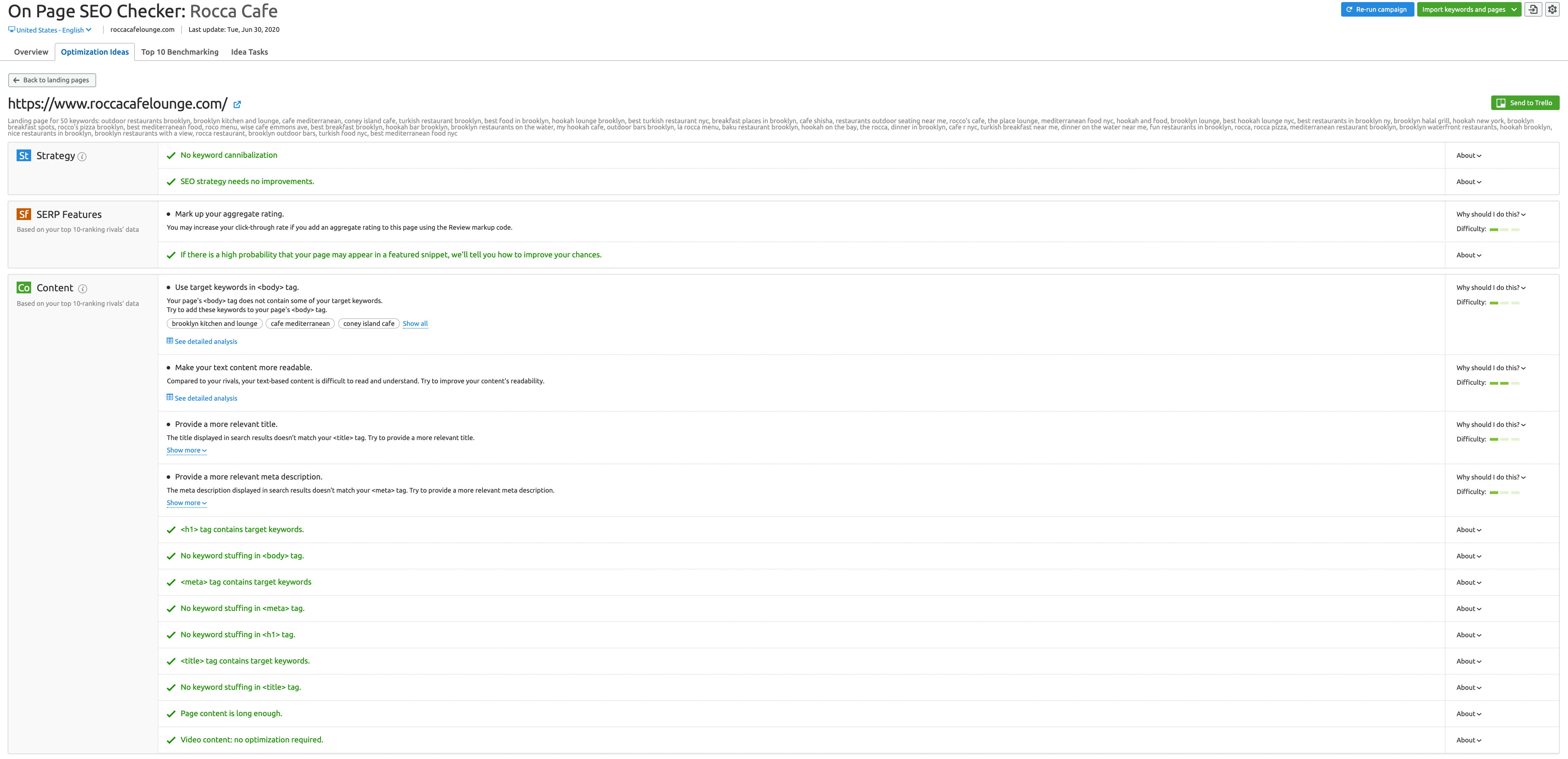
5. Create Great Content
It should really go without saying, but you need to make sure that you are creating great content across your site's pages.
Thankfully, the Wix editor makes it really easy to drop your content into place, but you need to put the time and effort into creating the content that your customers and clients want to see.
Our top tip here is to spend some time taking a look at the content on the pages that rank in top positions for the keywords you are looking to target.
Head to Google and run a quick search for your main keyword and take a look at the content. Be inspired by the common content and points made across the top 5 sites and base your own page's structure around a format that is working for others.
You can use the SEMrush writing assistant to help you create content that will help you to rank.
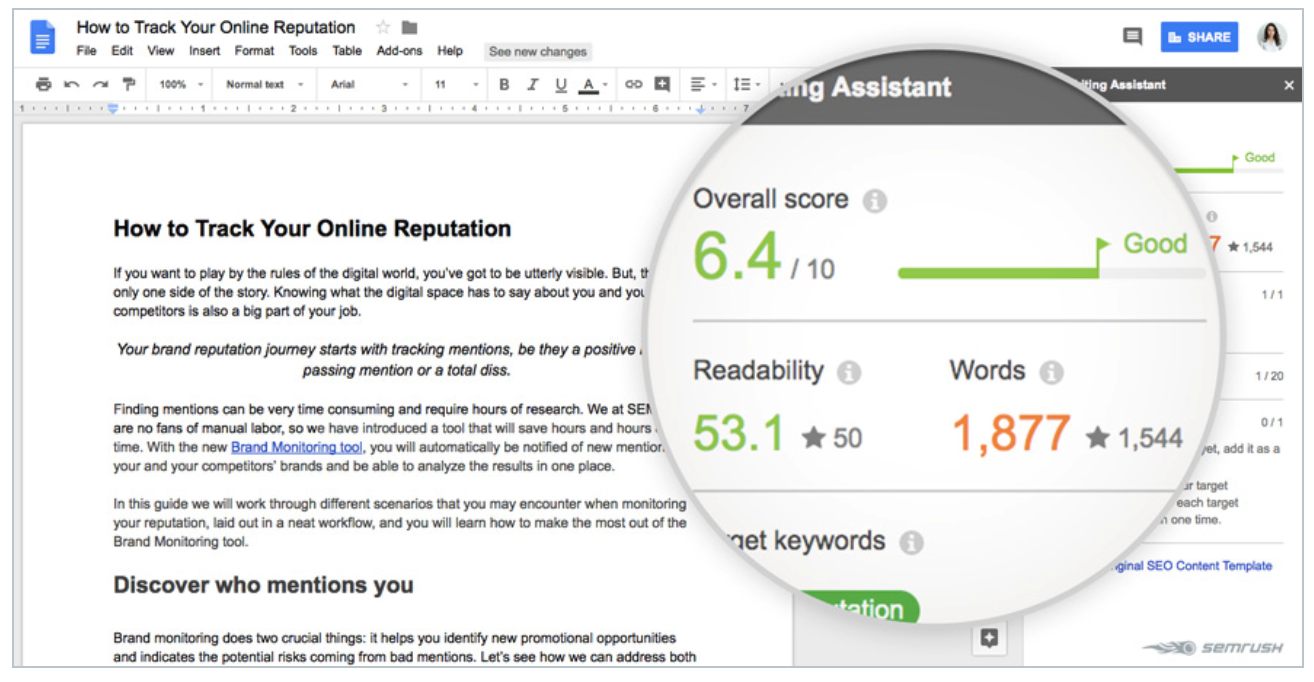
6. Use Optimized Page URLs
It might seem obvious, but you should always use search-engine-friendly and descript URLs for each page on your site.
And while Wix doesn't give you full control over every element of your page's URLs, you can edit the last part (or slug) of the URL.
You will find these editable on the same SEO (Google) tab as the title tag and meta description. Always use descript page URLs that align with the page content, separating words with hyphens (-), not underscores (_).
You can learn more in our guide to URL basics.
7. Use Optimized H Tags
A well-optimized web page uses heading tags to break up content into easy to understand and easy to read blocks, from H1 (the page's main heading) to H6. These can be nested where necessary, but you should only use one H1 tag per page.
Your page's H1 tag should use your page's main keyword, and H2-6 tags should use variants in reference to sections of the content.
Click into a text box on the main Wix editor, and you can set the H tag and edit the content as required.
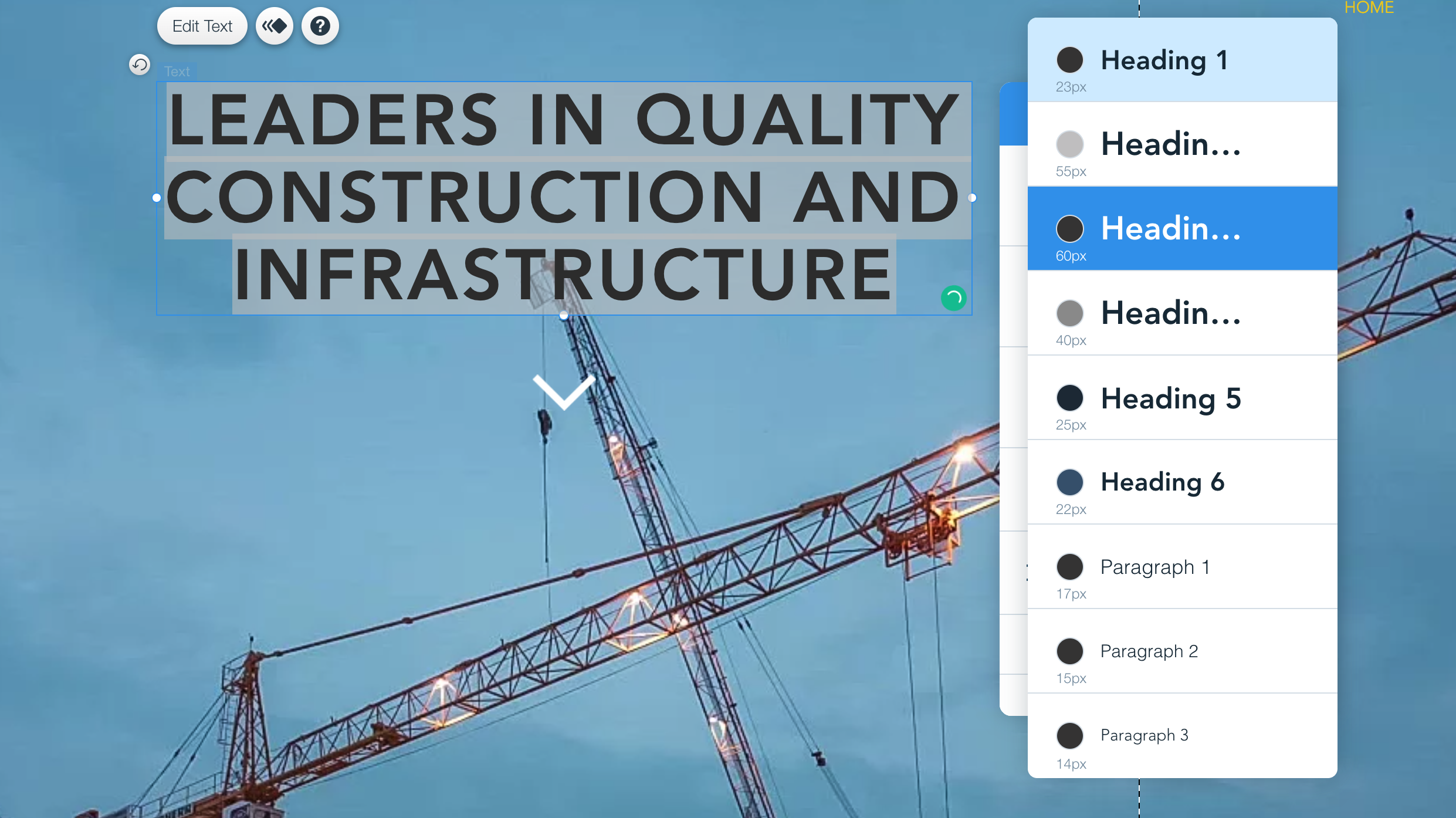
Learn more about writing a great heading tag here.
8. Add Internal Links
Internal links point from one page to another on your site and are one of the most underutilized SEO tactics.
The right internal linking strategy can help pass PageRank to key pages on your site and demonstrate the topical relevance between two or more pages.
Of course, this is also not forgetting that links are primarily navigational in nature and help users to navigate through your site and find what they need.
You can add internal links into your content through Wix by selecting the text you want to use as your anchor text and choosing 'page' from the pop-up. From there, you can select the page you want to link to.
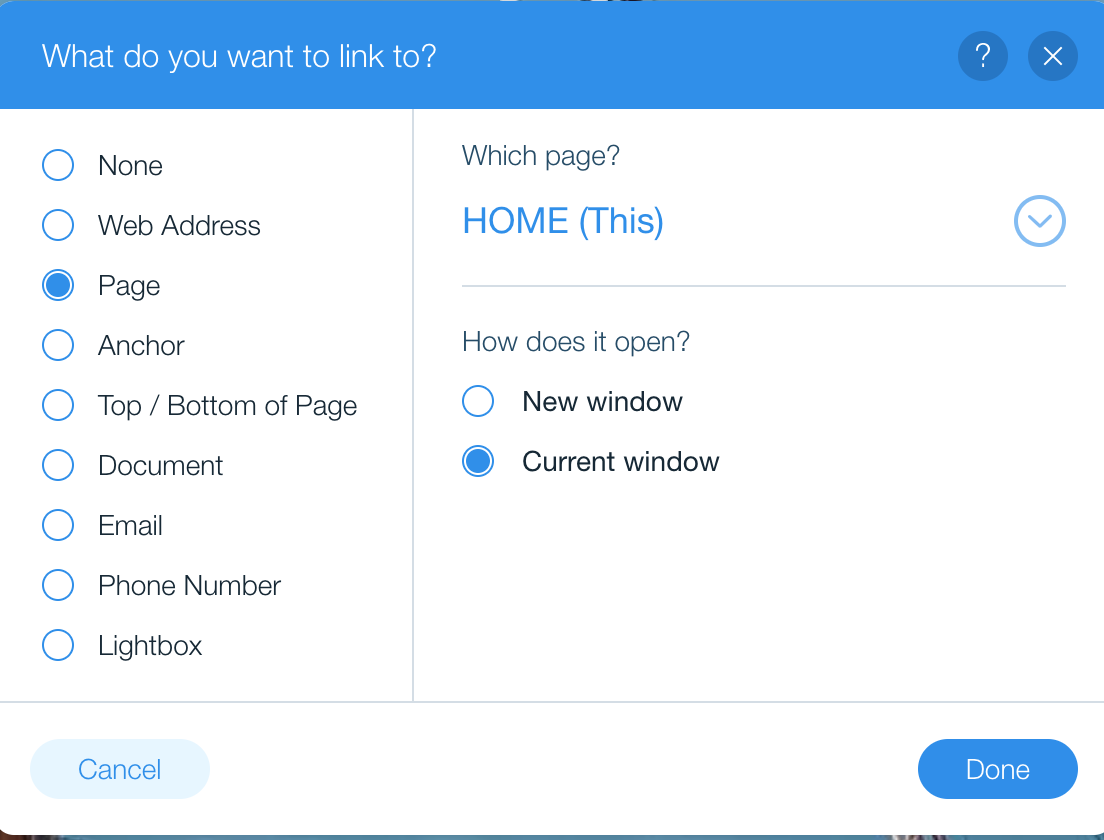
9. Create a Blog and Publish Great Content
We have already referenced the importance of creating great content, but one of the most effective ways to grow your site's organic traffic is to create a blog and consistently publish great content.
A great place to start learning is our ultimate guide to content marketing in 2020, which shares a really easy to understand overview of why content marketing should be a key tactic that you are using:
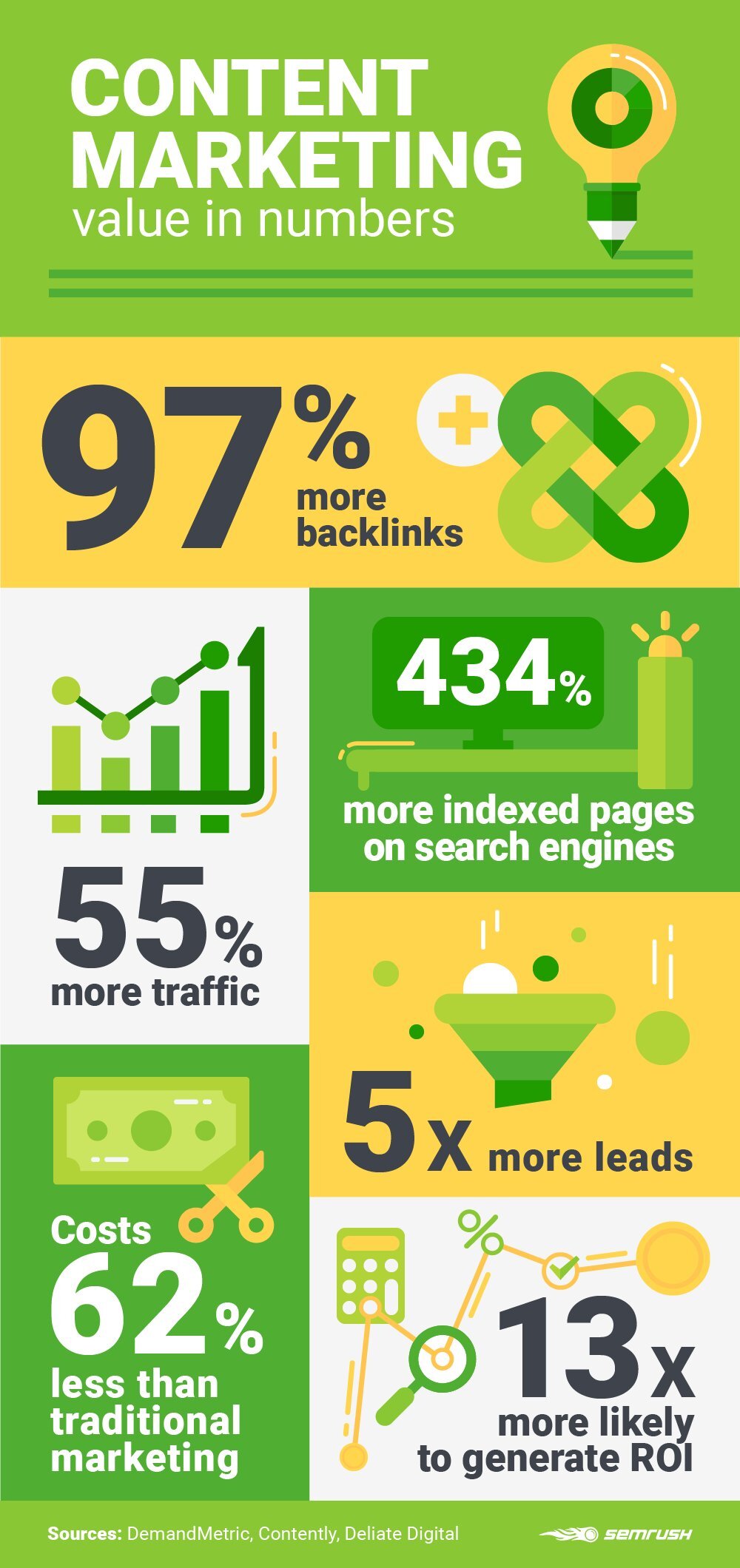
Blogging is, by far, one of the most accessible ways to use content marketing as a small business, and the great news is that Wix includes blogging functionality as standard.
Struggling to come up with blog post ideas? Check out this post.
10. Optimize Your Site's Images
Unoptimized images are one of the most common reasons for poor site speed; it is recommended that you take the time to optimize your site's images.
You are limited as to what you can improve when it comes to PageSpeed on Wix, but as a general best-practice, be sure to use images that are sized accordingly. That means if you are displaying an image at a maximum width of 800px, use an 800px wide image, not one that is 2400px wide.
You can use a tool such as ReduceImages to reduce the size of your images without losing quality.
Also, be sure to add unique alt tags to images on your web pages, which you can do by clicking onto any image and adding a descriptive keyword to the 'What's in the image? Tell Google' box. These tags help Google and those that use screen readers to understand what the image is about.
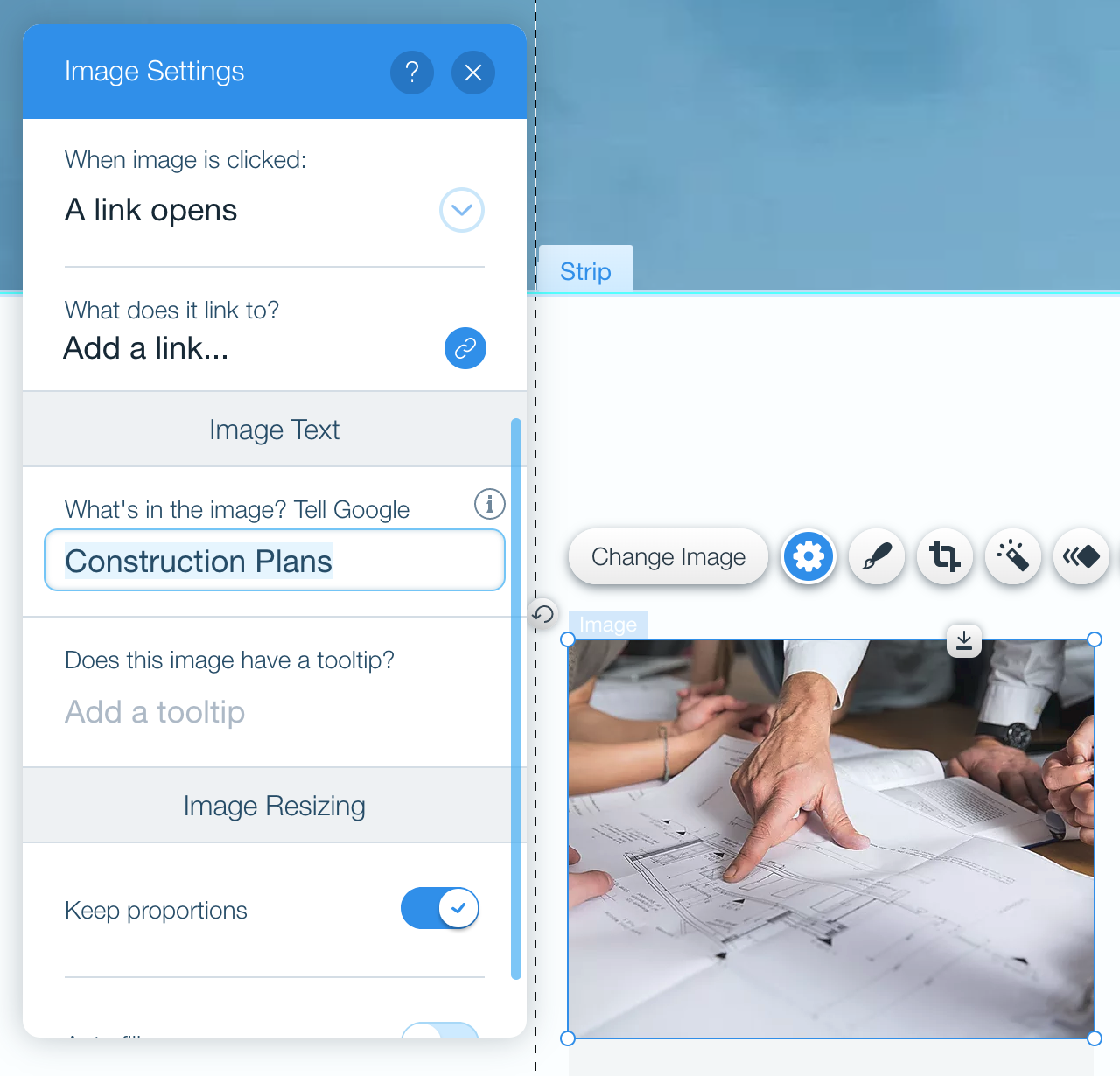
11. Build Backlinks To Your Site
Backlinks remain a key ranking factor in 2020, and the reality is that even small businesses need to build up authority on the search engines through relevant, quality links.
Essentially, links from one website to another act as votes of quality for Google and indicate that a site should rank in prominent positions.
Check out our full guide to link building strategies, or look at tactics for small businesses such as:
Local directory submissions Supplier links Association & member links Local PRWork on building up your site's authority, and you will see a noticeable impact in your site's SEO performance.
Taking Your SEO One Step Further
Of course, these top tips only cover the SEO basics, but what about when you want to take your site's performance to the next level out discover issues that could be holding back your performance?
You can use the SEMrush site audit tool to outline issues with your site from a technical perspective and continue to monitor on an ongoing basis any potential errors, warnings and notices that occur.
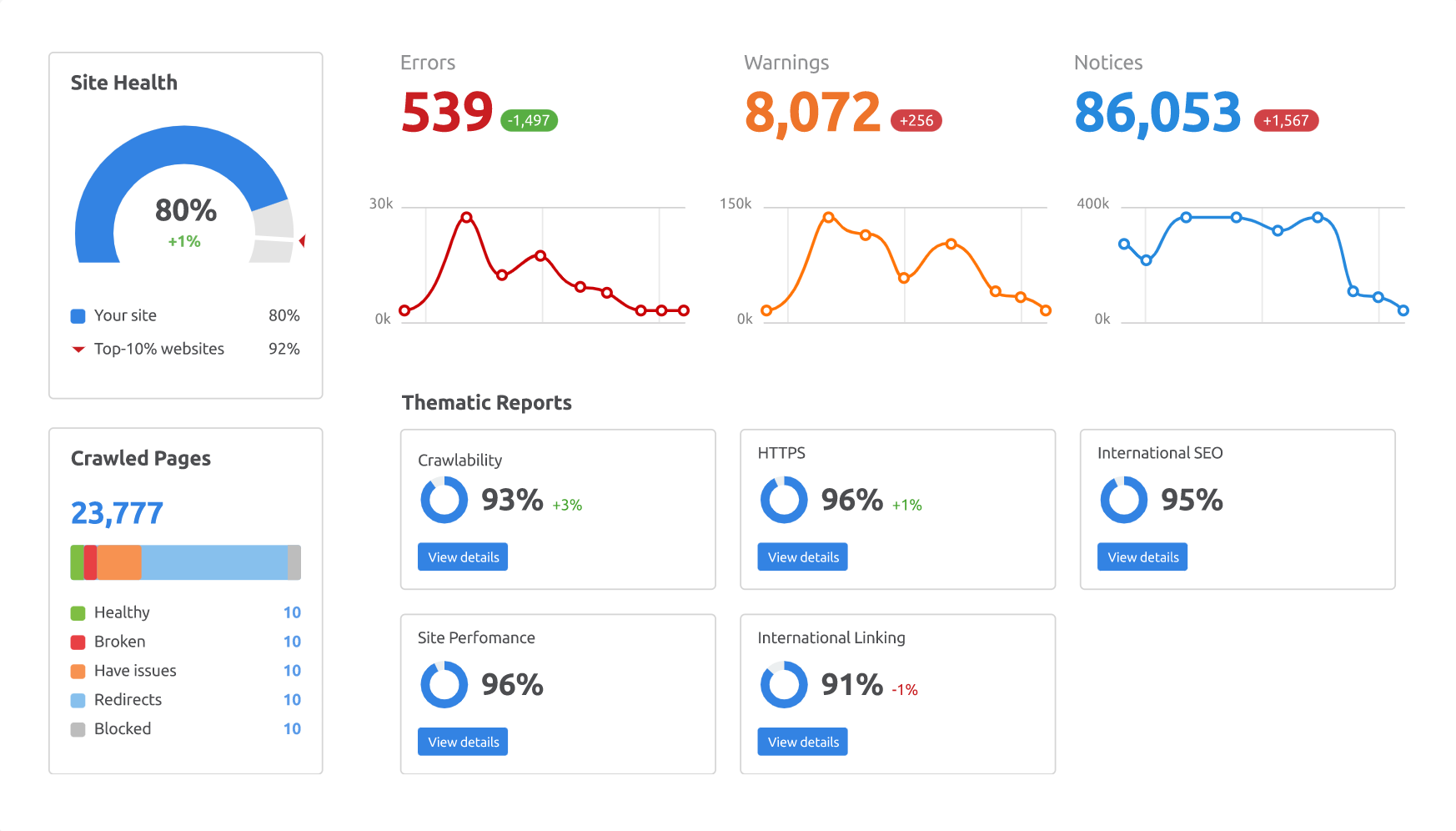
Wix remains a solid option for small businesses that want to build their own website.
It might not be the most advanced platform from an SEO perspective, but if you are looking for a place to start your business's journey on the web, you could do far worse.
Take the time to learn more about how SEO works, the basics you should be implementing, and learn about critical elements like keyword research, content creation, and link building, and you shouldn't find that you are held back simply by using Wix.
It is a great starting point and, when you put in the time and effort, there is no reason why you can't see significant increases in your Wix site's organic traffic and resultant inquiries or sales.
Innovative SEO services
SEO is a patience game; no secret there. We`ll work with you to develop a Search strategy focused on producing increased traffic rankings in as early as 3-months.
A proven Allinclusive. SEO services for measuring, executing, and optimizing for Search Engine success. We say what we do and do what we say.
Our company as Semrush Agency Partner has designed a search engine optimization service that is both ethical and result-driven. We use the latest tools, strategies, and trends to help you move up in the search engines for the right keywords to get noticed by the right audience.
Today, you can schedule a Discovery call with us about your company needs.
Source:





